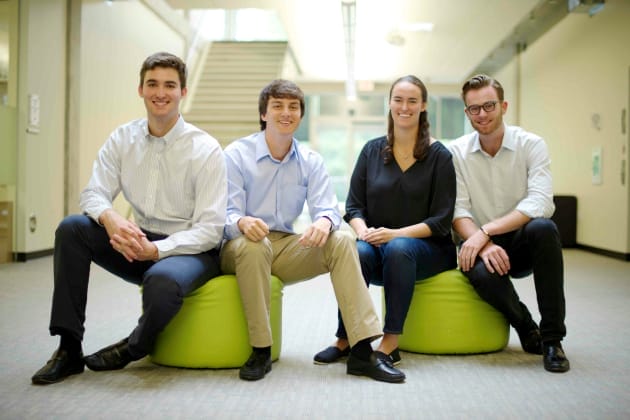Fever Smart is a smart thermometer that allows parents to monitor their child’s temperature continuously and remotely. It’s already FDA approved, and its Indiegogo campaign this fall reached its goal in just four days, ultimately raising $62,986—157 percent of the $40,000 goal. The great press that Fever Smart got in CNET, Business Insider, VentureBeat and other outlets undoubtedly helped.
Pretty good for a company founded by four Penn undergrads, Wharton’s Aaron Goldstein and Collin Hill, engineering student William Duckworth, and alumna Becca Goldstein, C’14.
Fever Smart is a member company in the Venture Initiation Program, as well as one of seven startups selected for the first class in the new Digital Health Accelerator at the University City Science Center, which granted them $50,000 in operational support. They are currently working to adapt the system to help those at risk for Ebola to monitor for signs of fever.
Aaron Goldstein is the company CEO, and he’s also Entrepreneur Magazine’s College Entrepreneur of 2014. He answered some questions for us about his experiences as an entrepreneur:
QUESTION: Why are you an entrepreneur?
AARON GOLDSTEIN: I find it incredibly rewarding to take an idea, scribbled on the back of a piece of paper, work hard and turn it into a successful business. From a young age I have always been independent and self-motivated. I think that over time this morphed into me wanting to be my own boss and be in control of my future.
QUESTION:Why this company?
GOLDSTEIN: My father is an Emergency Room physician, so I’ve grown up around the healthcare field. I guess that through osmosis of being around him, I became aware of the lack of innovation in the healthcare field. I believe that the smartphone is going to transform the way that medical care is going to be delivered and I want to help build technologies that are able to save lives.
The idea for Fever Smart is based on the personal struggles of one of the other co-founders, Collin Hill, who I met as a freshman at Penn. Collin was diagnosed with Hodgkin’s Lymphoma at the age of 19. A serious issue during the healing process became clear during his chemotherapy treatments. Throughout the entire chemotherapy regimen and after a patient leaves the hospital, it is essential for the patient to have access to medical facilities if the patient’s fever exceeds approximately 100°F. Collin often slept through his fevers at home, and upon waking up, was rushed to the hospital with a fever of 103°F or higher. There was no solution to this issue offered by his doctors, and Collin remained frustrated with the lack of technology available to resolve the problem, and the problem of thousands of other patients.
QUESTION: What has been the most exciting moment so far in starting Fever Smart?
GOLDSTEIN: I would say the most exciting moment thus far was hitting the “launch” button on our Indiegogo campaign. We had been working on the startup for almost 18 months, and we were finally ready to begin preselling the product. It’s interesting because you do all of this work building the product, yet until you actually try and sell it, you have no idea if it is going to be a success. Luckily for us, our Indiegogo campaign went extremely well, and we quickly surpassed our $40,000 goal.
QUESTION: What has being in the Venture Initiation Program meant to you?
GOLDSTEIN: VIP has connected us to a variety of mentors who have been able to provide us with incredible advice regarding Fever Smart. VIP has also connected us with like-minded students who are also in the process of building their own startups. It is always great to talk to other student-entrepreneurs because so often we are facing similar challenges and are able to learn from each other.
QUESTION: Why did you want to start a business as a student?
GOLDSTEIN: I don’t think that I necessarily wanted to start a business as a student, it sort of naturally happened. I think that the best time to start a business is when you’re in college because of the tremendous amount of resources on campus to help you, especially at a school like Penn.
Editor’s note: The original version of this article appeared on the Wharton Entrepreneurship Blog on Jan. , 2015.

























